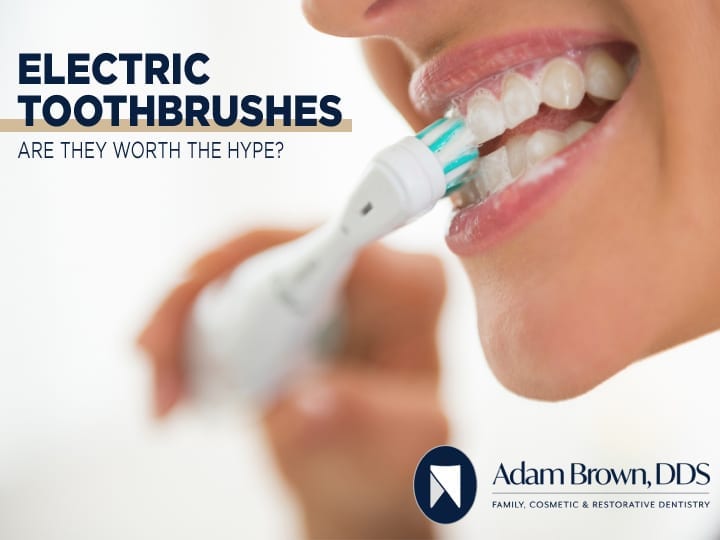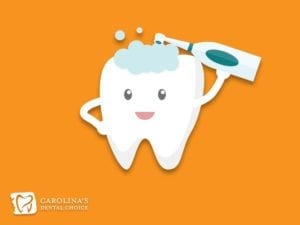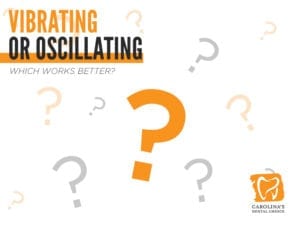Electric Toothbrushes: Are They Worth the Hype?
At Carolina’s Dental Choice, we think the most important thing is to brush and floss regularly. Beyond that, we do believe there are some excellent advantages to owning an electric toothbrush.

Before you rush out to buy one, let’s review some of the details.
What the Studies Show
A review of studies done by the Cochrane Library in 2014 showed that “Powered toothbrushes reduce plaque and gingivitis more than manual toothbrushing in the short and long term.” Below you will find key results of the controlled studies where manual and electric toothbrushes were compared.
· At one to three months of use, there was an 11% reduction in plaque when using the electric brush.
· After using an electric toothbrush for over three months, there was a 21% reduction in plaque.
· At one to three months, there was a 6% reduction in gingivitis (with the electric).
· After three months, there was an 11% reduction (also with the electric).
Though the old-fashion toothbrush has done the job of keeping our teeth and gums clean for years, the electric toothbrush is the future of oral care. There is no denying an electric toothbrush is better at removing plaque and gingivitis. And, there are even more benefits to the electric toothbrush than these.
Under Pressure
When we brush, it’s natural to feel the need to apply extra pressure in order to scrub our teeth clean. Unfortunately, we tend to use too much force, which may result in pushing our gums back (in addition to scraping the enamel off our teeth). This little bit of extra pressure exposes the pink membrane that covers the roots of the teeth. Eventually, once the roots of the teeth become exposed due to heavy brushing, they become susceptible to decay and disease. Even worse, once the gums have receded, it is difficult to get them back, often requiring painful surgery with long recovery time. The better solution is to use a brush that knows when you are applying too much pressure so your gums can remain healthy and intact.
Recent studies show that when we use an electric toothbrush, we become more focused on the process of brushing, and therefore apply less pressure.
A side benefit of electric brushing is the unfamiliarity of the appliance requires more attention from our brain; therefore, we pay closer attention to the process of dental care.
Ease of Use May Be Better for Seniors, Impaired and Children
 Another benefit to using an electric toothbrush is that it works much better for those with limited mobility.
Another benefit to using an electric toothbrush is that it works much better for those with limited mobility.
With over three million cases cited each year, carpal tunnel—a painful syndrome that restricts mobility in the wrist—can make brushing painful. But with an electric toothbrush, you use your wrists much less. Just turn it on and let the bristles do the work.
Seniors with arthritis in their hands or limited shoulder mobility find electric brushes more comfortable to use.
An electric brush is also beneficial for youngsters. Once they reach the age where they begin to brush themselves, parents often find themselves re-brushing to hit all the missed spots. Children that use electric toothbrushes tend to brush more teeth and do a better job cleaning them, which leaves less work for mom and dad.
It’s a great training tool for kids because most electric toothbrushes have a pressure sensor that lets you know when you are, indeed, pressing too hard. Beginners hear the beep and are better able to find the right level of pressure to apply.
The Cost
One of the biggest (if not the biggest) deterrents people offer for not switching to an electric toothbrush is the perceived high price they often carry. The truth is that issues with gums due to manual brushing and trips to the dentist are way more costly in the end. We definitely believe they are worth investment, but to be thorough, we have broken down the cost factors to that our clients may make an educated choice.
We considered the cost of buying new heads and batteries in our research.
Let’s start by looking at the initial cost according to the level of toothbrush:
· A basic battery-operated, vibrating toothbrush costs between $5-$25. Now, this price might not seem very high, but to be honest, there’s not much of a difference between electric brushes at this base level and a standard toothbrush. These cheap electrics vibrate only, no oscillating. When it comes to electric toothbrushes, there is some truth to the notion, “you get what you pay for.”
· The next level up gets you a much more effective toothbrush, but it will cost you anywhere from $75 to $200. Yep, there’s that high price. But, at this level of brush, you will reap the benefits. Plus, depending on the brand of brush you buy, there are additional benefits, such as a timer included in the handle letting you know when to begin and stop brushing; pressure sensors that indicate when you are pressing too hard; a digital reminder letting you know when to replace the brush head; varying brushing modes, and more. This is the level most of us find ourselves shopping. Anything less seems pointless.
· The third level of brush may cost anywhere from $400-$1,000. These brushes include more capabilities, better construction, and materials used.
Now let’s have a look at the additional costs:
· Typically, an electric brush head needs to be replaced every 2-3 months. These heads can cost anywhere from $5-$25, depending on the brand and style you have. Most heads can be ordered (in bulk for a discount) or may be found at your local grocery store.
· If you have a brush that uses batteries, they will need to be replaced every 4 to 6 weeks. This, of course, adds up—but if you find yourself about to purchase a battery-operated toothbrush, chances are it falls into the first level of brush mentioned above, and therefore not any better than your old standard brush.
· Plug-in brushes don’t require batteries, but they do depend on the power running through your house. The overall cost to charge your toothbrush is small.
When it comes to cost, it’s best to find the brand and style you feel most comfortable with first. Then look into each aspect of the price.
Vibrating or Oscillating? Vibrating or oscillating, which works better?

In a study done by the US Library of Medicine, where a 12-week comparison was done between the two types of brushes, the oscillating brush came out on top. The study specifically states, “The oscillating-rotating power brush provided statistically significantly superior reductions compared to the sonic brush…” and goes on to show the oscillating brush causes less bleeding and does a better job at reducing gingivitis and plaque.
Best Electric Toothbrushes for the Cost
In June of this year, The Strategist came out with a list of the “Best Electric Toothbrushes, According to Dentists,” and here are a few of the ones we liked the best:
Oral-B White Pro 1000 Power Rechargeable Electric Toothbrush ($50)
One of the biggest benefits to this brush is its ability to oscillate and vibrate. It also comes with a timer and pressure sensor and does not require batteries. This is a great way to break into the world of electric toothbrushes.
Oral-B 7000 SmartSeries Rechargeable Power Electric Toothbrush ($128)
This brush has all the capabilities as the Pro 1000, but it has an additional six cleaning modes—including one for your tongue. There is even Bluetooth connectivity so you can monitor and track your brushing habits with your phone. Another benefit to this brush is it uses smaller heads. This can help those who have smaller mouths and/or a sensitive gag reflex.
Philips Sonicare ProtectiveClean 4100 Plaque Control ($50)
Even though this brush does not have the circular, oscillating components it does still oscillate—it just does so as one solid piece, rather than multiple cylinders. It comes with a timer, pressure sensor, and naturally soft bristles. Users of this brush note how good the vibration feels, and that the toothbrush does an excellent job at breaking up tartar and plaque.
Philips Sonicare Diamond Clean Classic Electric Toothbrush ($178)
Much like the Oral-B 7000 Series, this brush is the higher-end version of the Philips 4100 Plaque Control. This brush comes with everything the 4100 has, with the addition of five different brushing modes such as “sensitive” and “gum care.” Users say this brush lasts longer, as it is made of high-quality materials, and that it provides that just-back-from-the-dentist level of teeth cleaning.
Overall, we find electric toothbrushes worth the switch. The cost is a bit more, but if you shop around you can often find them on sale. And, after trying different brushes, doing some research on the best brand for you, we think you will find that the most significant expense is the initial cost.
If you are considering changing to an electric toothbrush, feel free to come to talk with us at Carolina’s Dental Choice so we can help you get the best product possible.
